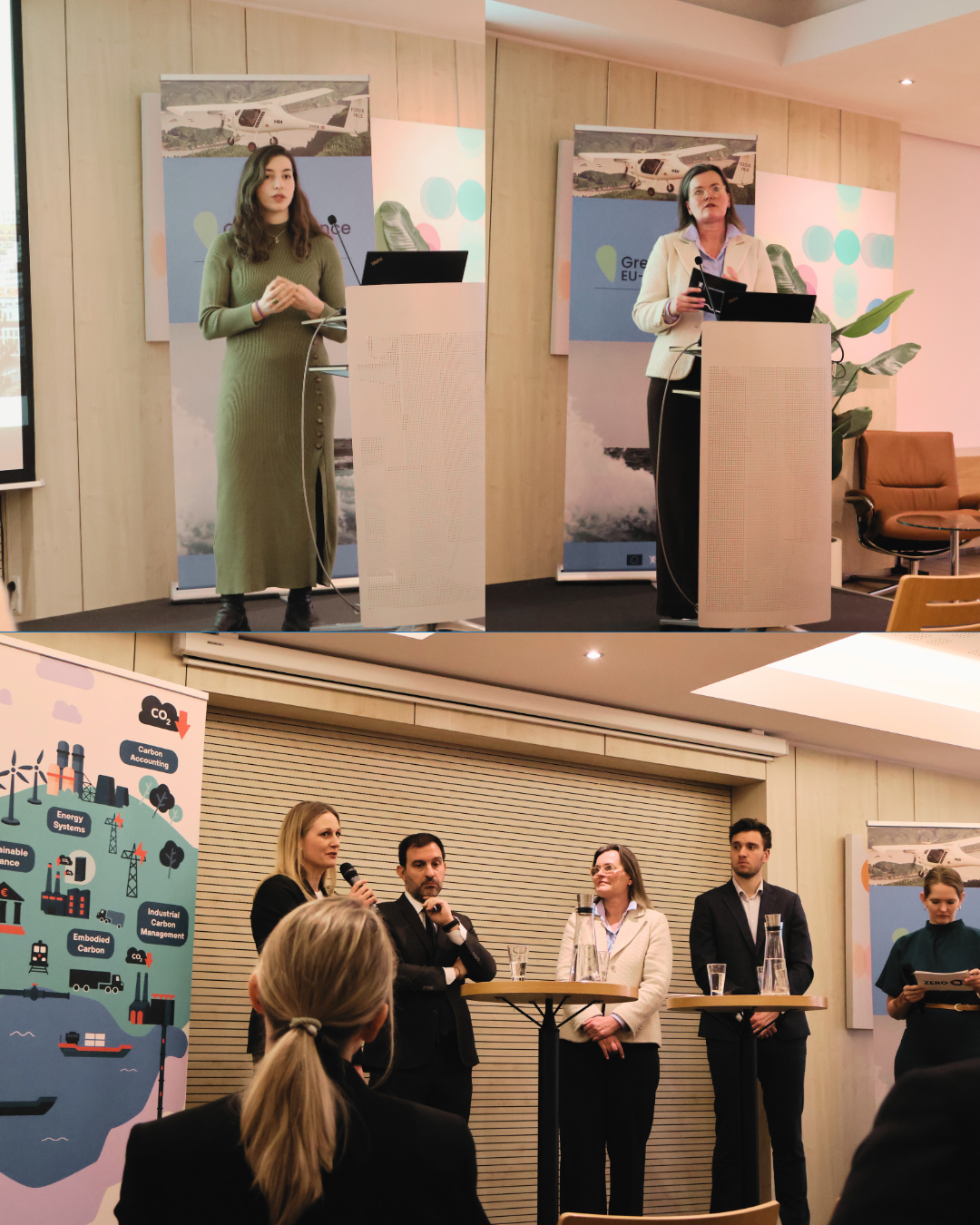
Joint letter – ICC reform and expansion risks diverting ETS Revenues from real climate action
In light of the European Commission’s ongoing considerations to amend the ETS State Aid Guidelines, revising the rules for Indirec...
News

Publish date: February 22, 2024
News
The Net Zero Industry Act (NZIA) trilogues came to a close on February 6th. Bellona Europa has closely followed the NZIA and advocated for an agreement safeguarding climate impact and targeted CCS deployment on the three chapters regarding carbon capture and storage (CCS) in particular. The consolidated text from the trilogues, as published after approval by the Permanent Representatives Committee on the 16th of February, is strongly supported by Bellona Europa, and in line with the aims of the original legislation. ‘ As already highlighted by Bellona Europa in its piece “clearing the air on the NZIA” published on the 26th of October 2023, three key points were of crucial importance to safeguard the final NZIA. With the version published on the 16th of February Bellona Europa congratulates the involved stakeholders as these 3 points and recommendations have indeed been included in the final version, in addition to the crucial overarching recommendation of full value chain recognition:
EU storage Injection Capacity Target of 50 mtpa by 2030
The initial text proposed by the Commission called for a target of 50 Mtpa storage injection capacity to be developed by 2030 within the EU. Over the course of the negotiations and political process, a reduction of said target was called for due to inadequacy of capture projects to ramp up to 50 Mt by 2030. There was also calls to include EEA storage capacity within the 50 Mt target. Bellona Europa, in its piece dated 26thof October 2023 and in dialogue with stakeholders sought to address these claims and highlighting the importance of staying true to the EC original proposal. In particular by highlighting that 50 Mt is amply available and achievable within 2030 timelines within the EU, and the legal difficulties and potential investment risks arising from an EEA inclusion without ensuring timely EEA implementation further highlighted in our Op-Ed in Eurativ titled “Breaking Europe’s emerging CO2 storage monopoly”. Additionally, the inclusion of EEA in the target would have resulted in a significant reduction of the ambitious target. The current text confirms an EU 50 Mt injection capacity target as a minimum. The exclusion of enhanced hydrocarbon recovery (EHR) has been maintained in the text throughout the process.
The final version of the text also seeks to ensure coordination with European third countries such as Norway and Iceland (EEA) and the UK. In particular, in recital (14a) where it is set out that international agreements relating to the permanent storage of European CO2 should provide “equivalent conditions to ensure permanently secure and environmentally safe geological storage of captured CO2 and ensure that the storage of European CO2 is not used to increase hydrocarbon production and corresponds to a genuine reduction of emissions”. This is ensured also by a report to be submitted 3 months after signing such international agreements to assess the implications of such an agreement, and in particular on how it promotes and safeguards the EU’s environmental standards, climate objectives and need for potential additional Union policies.
Full Value Chain Recognition
A huge win for the CCS value chain is the inclusion of transportation aspects, ensuring to that end accessible storage sites. The initial text was intended not to address the entire value chain (transportation in particular) within the regulation. The final text goes beyond by including transportation infrastructure considerations in two places; the first (article 17a) tackles the coordination requirement for cross-border infrastructure such as pipelines. The second (article 18a) focuses on the market regulation of transport infrastructure, calling for a regulatory framework that ensures open, fair and non-discriminatory access to CO2 storage and transport network – in line with similar language included in the Industrial Carbon Management Strategy published on the 6th February, read Bellona Europa’s full reaction here. This is also in line with the report published by the CCUS Forum Working Group on Infrastructure, where Bellona Europa is a co-chair. This clearly shows the NZIA’s role in the holistic and coordinated approach towards a European market for CO2 . Bellona Europa recognises and have long advocated for such an important regulation of a market for CO2 .
Unprecedented Obligation on Oil and Gas Producers
The NZIA places an obligation on oil and gas producers, an initiative which expectedly faced an uphill battle throughout the political process. This was despite widespread support from Bellona Europa together with CATF and CCS Europe outlined the need for such an obligation to ensure the timely development of crucial storage capacity in an Op-Ed in EnergyMonitor.
The original NZIA text did however lack the inclusion of penalties for failure of the oil and gas to deliver on the obligation. In its final version, the NZIA now includes dissuasive and proportional penalties levied by the member states via administrative or legal processes when there is an infringement of the obligation. This welcome addition gives much needed teeth to the obligation.
Bellona Europa also welcomes the retention of “oil and gas producers” as bearers of the obligation. While a proposed extension to “sellers of oil and gas” was well intentioned, and something Bellona Europa wishes to see further elaborated on and potentially included in the future, the proposed wording was a this time too unclear and risked introducing unnecessary uncertainty on the actual bearers of the obligation. The ambiguity of the term sellers posed risked watering down the obligation as attribution of responsibility would lack clarity.
Another relevant development regarding the obligation was the proposed text1 by Netherlands and Denmark on potential exemptions to the obligation on oil and gas producers outlined in article 18. Seeking to take into account also scenarios where significant number of or sizeable actors outside of oil and gas are interested in developing storage capacity. The amendment that made it to the final text allows member states to apply to the Commission for an exemption of oil and gas producers from fulfilling their contribution in their territory if:
Exempted entities may enter into agreements for storage injection capacity development within the member states ensuring that the capacity is on top of the surpassed capacity. This compromise allows other actors interested in developing storage capacity to not be sidelined, but still safeguarding the development of injection storage capacity and that oil and gas producers themselves cannot try to get away from or circumvent the obligation.
With the finalisation of the storage injection capacity target and the unprecedented obligation on oil and gas producers, the focus now turns to member states. They will need to follow through on the required reporting, support CCS value chain development and hold oil and gas producers accountable in case of infringements to ensure the NZIA delivers its potential. There is yet a long way to go in terms of realising and deploying the needed scaled CCS value chain within Europe, but the NZIA is a great start, by tackling the bottleneck of storage site development, the EU can now focus on building up to net zero.

References:
A leaked non paper put forward by Netherlands and Denmark in the Council: https://www.endseurope.com/article/1846431/net-zero-industry-act-eu-council-favours-flexible-carbon-storage-obligation

In light of the European Commission’s ongoing considerations to amend the ETS State Aid Guidelines, revising the rules for Indirec...

On 24 February 2025, Bellona Europa co-hosted a breakfast seminar at Norway House in Brussels alongside ZERO and the Mission of Norway to the EU, bringing together policymakers, manufacturers, and procurement practitioners around a single conviction: European cities hold a decisive and largely untapped lever for decarbonising construction. With the revision of the EU Public Procurement Directives on the horizon, the moment to use it is now.

Opening remarks and future of EU CRCF Market Christian Holzleitner, Head of Unit for Land Economy and Carbon Removals&nb...

Together with six NGOs and five industry partners, Bellona Europa signed a joint letter on the RFNBO Delegated Act, reiterating that now is not the t...

“The Commission shall monitor the situation at Union level with a view to monitoring the impact of the CBAM on the Union i...
Get our latest news